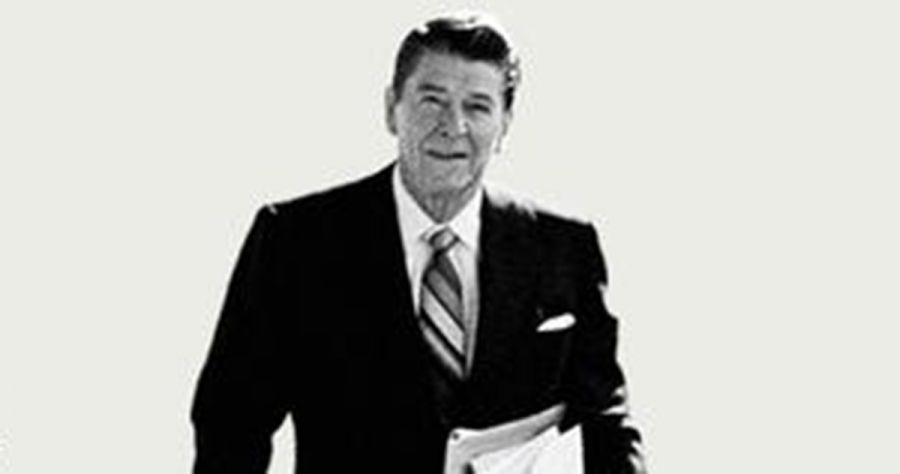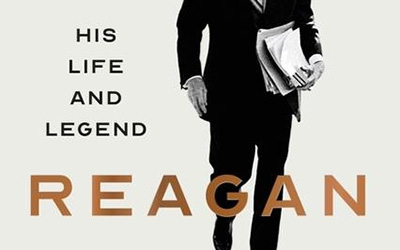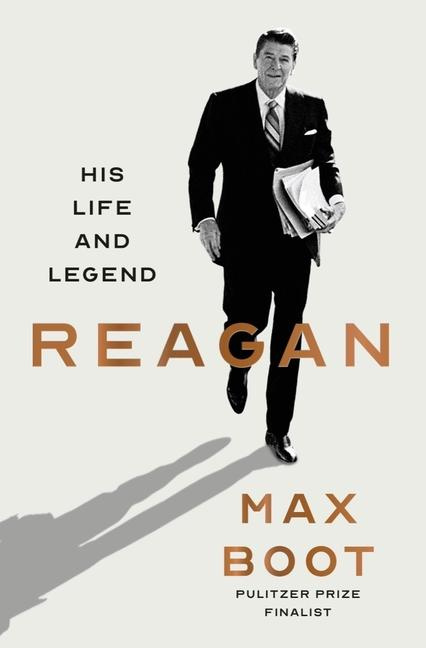
- Free Article: No
- Contents Category: Biography
- Review Article: Yes
- Article Title: Reagan’s nemesis?
- Article Subtitle: The most readable biography of Ronald Reagan
- Online Only: No
- Custom Highlight Text:
When Ronald Reagan died in 2004, Americans of every kind, ‘in rows three to five deep, thronged Pennsylvania Avenue to catch a glimpse of this melancholy but historic funeral procession’. In a note the presidential historian Richard Norton Smith wrote to Reagan’s widow, Nancy, he assured her that ‘their grief was equalled by their gratitude for a life that had become synonymous in their eyes with the nation itself’.
- Featured Image (400px * 250px):

- Alt Tag (Featured Image): Timothy J. Lynch review ‘Reagan: His life and legend’ by Max Boot
- Book 1 Title: Reagan
- Book 1 Subtitle: His life and legend
- Book 1 Biblio: Liveright, US$45 hb, 874 pp
- Book 1 Cover Small (400 x 600):

- Book 1 Cover (800 x 1200):

- Book 1 Readings Link: https://www.readings.com.au/product/9780871409447/reagan--max-boot--2024--9780871409447#rac:jokjjzr6ly9m
This is certainly the most readable biography of President Reagan. Boot writes with clarity, in fifty-four short chapters. He is a journalist and think-tanker, rather than an academic. The weight of the book, its ten-year writing span, its extensive interviews, its adulation from legacy media, all suggest the defining biography of the most important president of my lifetime. And yet, I ended my summer break in Boot’s company unconvinced.
The book indulges a preference for transformation. Author and subject both underwent two key ones. Boot went from being a Russian to being an American; Moscow-born, he emigrated to the United States as a child. The writing of Reagan, over the past ten years, occurred as the author transitioned from a reliably conservative scholar to a left-leaning pundit. Halfway through Reagan, to denounce what Donald Trump 1.0 had wrought, the author detoured to write a confessional book titled The Corrosion of Conservatism: Why I left the right (2018). I am sceptical of right-to-left conversions. The other way around is part of the natural order of things. But to go from conservatism to progressivism rarely looks convincing. Boot makes this an animating principle of his book.
Reagan’s two conversions, if we can call them that, were from a New Deal Democrat in the 1930s to a Barry Goldwater Republican by the 1960s; and from a Russophobe, in his first term as president, to a Russophile, making deals with what he had previously called an ‘evil empire’, in his second.
Because of the author’s dispositional switcheroo, he is forgiving, even applauding, of Reagan’s. The book’s introduction is subtitled ‘The Pragmatist’. The author admires Reagan not for his stringency but for his flexibility: ‘the Great Communicator was also the Great Compromiser’. This depiction undoes the caricature – the titular ‘legend’ – of Reagan ‘as simply an idealist or zealot.’ Sure, he could use ‘coded racism’ to win over voters in the South in 1980. This was a strategic choice rather than a moral conviction, and thus, we presume, not how Boot would describe his own conversion.
Ditto Reagan’s anti-communism. He made his name as a journeyman actor, helping ferret out Hollywood leftists; his task today would be immeasurably greater. He had a hard line on the USSR for three decades. But in the middle 1980s he changed his tactical approach, like Rocky Balboa in the ring with Apollo Creed, to realise strategic advantage.
Boot’s Reagan adapts, parries, ducks, and weaves. When, in 1983, 241 US marines are killed by terrorists in Beirut, Reagan doesn’t declare a war on terror: he runs away, withdrawing the deployment that invited the attack. Despite his reputation as a warmonger, Reagan preferred short, sharp police actions (in places like Grenada and Libya) to sapping wars (of the kind his successors waged).
Boot disdains Donald Trump because the forty-fifth and forty-seventh president does not shapeshift. He has no capacity for transformation, for learning on the job. Reagan did. Boot is not the first biographer to make this his focus. James Mann, for example, claimed in 2009 that ‘the rebellion’ of Reagan against his hardline supporters was the decisive factor in the end of the Cold War. Boot is right to credit Reagan’s pragmatism with the explanatory power he does. But this is not any kind of new revisionism.
 Ronald Reagan and Donald Trump, 1987 (White House Photographic Collection via Wikimedia Commons)
Ronald Reagan and Donald Trump, 1987 (White House Photographic Collection via Wikimedia Commons)
The author’s sympathy for his subject is proportionate to Reagan’s embrace of a pragmatic (read: less right-wing) agenda. The fortieth president thus fares badly, in Boot’s retelling, for his ambivalence towards, if not actual connivance in, the AIDS epidemic which began in his first term. This claimed the life of Roy Cohn, the young Trump’s Svengali, Boot reminds us.
Was Ronald Reagan a racist? Boot applies a modish liberal lens to the complicated racial politics of the 1970s. Viewed through it, yes, Reagan has a case to answer. But then, how much larger is the indictment of his Democratic opponents of that era measured against their contemporary priorities? Northern Democrats established a welfare state that devastated the Black family. Southern Democrats held onto segregation for as long as they could.
Professors often chide simplicity (Boot himself overuses ‘simplistic’ in his assessment of Reagan’s style and approach). They see in Reagan not quite an idiot savant but a man out of his depth. But for all his technocratic mastery, Jimmy Carter hardly enjoyed success in comparison to Reagan. Lyndon Johnson was surrounded by the best and brightest Harvard liberals, and he ended up mired in Vietnam.
Reagan understood the world in simple (not simplistic) black and white, good and evil terms. Details did not much interest him. While this got him into the bother of Iran-Contra (which seems much less scandalous in Boot’s recounting than it felt at the time), it did not negate the effectiveness and flexibility of his diplomacy.
Reagan’s 1987 admonition, ‘Mr Gorbachev, tear down this wall!’, appalled liberal professors at the time and doesn’t much impress Boot now. He dismisses the greatest line in all Cold War rhetoric as incidental. Again, this is not fresh revisionism; Edmund Morris makes a similar, dreary claim in Dutch (1999), as does George Schultz, Reagan’s secretary of state at the time. The Washington Post called it a ‘meaningless taunt’. But other accounts, drawing on primary sources in eastern Europe, dispute this. Reagan’s speech gave communists the willies by demanding what eventually came to pass, twenty-eight months later. Boot misses the import and drama of Reagan’s Berlin Wall speech. In retrospect, Reagan’s prescience was extraordinary.
In the whole benighted history of the Soviet project, there was not one equivalent line, by even one of its leaders, that sold the benefits of communism as Reagan’s did of liberty. The prominence of ‘We will bury you!’ in Russian rhetoric makes the point. Reagan knew he was on the right side of history. This assessment was more genuinely revisionist than Boot’s professed kind.
When the Berlin Wall fell, during my second month at university, it suggested that the world Reagan made (aided by Margaret Thatcher, consideration of whom is too meagre in the book) would be the one in which Boot and I (we are the same age) would make our way. History ended. Western self-confidence soured. Our universities are today full of conservatives because of him.
Okay, it didn’t quite pan out that way. The vanquished left soon found more fertile soil in culture and campus than they ever did in politics and economics. Reagan forced them to fight on this alternative terrain. Ironically, he also bequeathed progressives a much-enlarged federal government, and historic levels of spending, to set their sights on.
The president who said ‘the nine most terrifying words in the English language are “I’m from the government and I’m here to help’” has, named after him, the largest federal building in Washington DC: the Ronald Reagan Building. Reagan gave America big government conservatism, and, in turn, a Democratic politics determined to expand national power into the minutiae of everyday life.
But did he thereby give us Donald Trump and a movement determined to roll back that ‘deep state’? ‘Did Reaganism,’ asks Max Boot, ‘contain the seeds of Trumpism?’ The author abhors Trump. That is a problem in his comparative analysis. Better to imagine yourself a presidential biographer in a hundred years’ time, weighing the connection.
If anything, Boot does not consider the comparisons and contrasts enough. The similarities are several but not profound. Both men were screen stars before they were politicians. Both were divorcees (the only two of the forty-six presidents to be so). Both started with Democratic sympathies before finding a home in the Republican party. Both campaigned to ‘Make America Great Again’. Both were furiously, and ineffectually, hated by the left – they were each blessed with poor opponents. Both avoided foreign wars. Both, Boot insists, ‘mishandled a pandemic’ – AIDS and Covid-19 – and ‘catered to white bigotry to win office’ (though how this squares with the huge swing to Trump from voters of colour in 2024 we are not told, publication preceding the election).
Boot mentions but does not examine perhaps the most important link between Reagan and Trump: the passing, in the final month of Reagan’s term, of the US-Canada trade agreement. This became NAFTA five years later: ‘the worst trade deal ever made,’ said Trump. The defenestration of the US blue-collar worker, which has won Trump two terms as president, was begun by Ronald Reagan. Trump is not a perverse and inevitable fulfilment of Reagan, but his nemesis. It is a conclusion Boot rejects, though he martials much evidence in its defence.


Comments powered by CComment